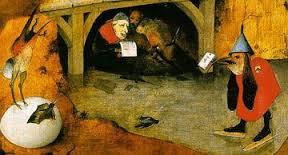The presence of eternity is terrifying. The idea that something is there and won’t go away may inspire many a mystic but it may also evoke horror. This is especially the case if that presence turns away from humankind and promises no kind of salvation. Many of us have no interest in facing this presence since it may strip us of all faith and hope. However, some modern thinkers and writers have wondered whether or how thoughts or writing itself stand up to the test and how these thoughts or jottings relate to “me.” When I write, does my writing turn against me? Or does it aid me and offer me some kind of shelter against the horror of eternity?
Taking his lead from Albert Camus and Franz Kafka, Maurice Blanchot in an essay entitled “The Limit Experience,” contemplates the possibility that speech, instead of guarding us against the “abject” is “something very abject and very deceptive, which is to say, once again, the desolation of hell.” This speech, says Blanchot, is “strange speech.” It doesn’t assert any mastery over the world and, because it rejects man, is located at the “limit” of humanity.
Blanchot uses Franz Kafka’s aphorism on crows to articulate what is at stake:
Crows claim that a single crow could destroy the sky. This is no doubt so, but it proves nothing about the sky for the sky signifies precisely: the impossibility of crows.
According to Blanchot’s reading:
Crows, here, are men and their idle and pretentious thoughts; the pretentious “logical” and “humanist” thought that asserts that a single thought can destroy the absurd. This is no doubt so, but it does not affect the sky of the absurd for the absurd signifies the impossibility of (logical) thought. (182, The Infinite Conversation)
And here, in this “region of experience,” where Kafka reached (and where Blanchot reaches) by way of writing, it is “possible” that the “essence of man is the impossible.” Blanchot is fascinated with the possibility of this region. He is attracted to it and is willing to risk his humanity to experience his nullity. He wants to experience power of powerlessness. But why would anyone want to do that? Wouldn’t that be nihilistic? And wouldn’t that defeat the purpose of writing? Isn’t this desire for the possibility of experiencing the sky (eternity) privileging silence over speech and writing? Isn’t this experience terrifying and depressing?
Kafka, reflecting on what it means to write, tells us that he “wavers” in this region and this, in many ways, ruins his life. It seems to expose him to a life descending and growing weaker by the moment:
What will be my fate as a writer is very simple. My talent for portraying the dreamlike inner life has thrust all other matters into the background; my life has dwindled dreadfully, nor will it cease to dwindle. Nothing else will ever satisfy me. But the strength I can muster for that portrayal is not to be counted upon: perhaps it has already vanished forever, perhaps it will come back to me again, although the circumstances of my life don’t favor its return. Thus I waver, continually – fly to the summit of the mountain, but then fall back in a moment. Others waver too, but in the lower regions, with greater strength; if they are in danger of falling, they are caught up by the kinsman who walks beside them for that very person. But I waver on the heights; it is not death, alas, but the eternal torments of dying.
Kafka, it seems, doesn’t have a “kinsman who walks beside him” and can save him from falling. The Kafka-Bird is alone. He wavers above the eternal presence of the abyss. The irony is that he can fall down lower and live a normal life. He can turn to his best friend Max Brod or to his fiancé. He has possibilities for a full life with friends, children, and new possibilities. But Kafka seems to have chosen the path of literature and the inhuman. He seems to have chosen to waver over the abyss of eternity and the experience of powerlessness. However, if one reads him closely, we can see that he has not resolved to do this and that he entertains the possibility of a different, more human life. Unlike Blanchot, however, Kafka doesn’t abandon humanity by calling all of humanity crows. For if he did, it seems that he would be abandoning all hope. Language may fail, but is there still hope for humanity?
Where he wavers, the only hope he has is that he will have the “strength” to “portray the dreamlike inner life,” but, as we can see, there seems to be no hope of this strength returning. It’s too late. Reading all this, one must ask about hope. Walter Benjamin concluded, after reading Kafka for years, that Kafka’s “only certainty” was not that he would waver powerless above the “eternal torments of dying” but that only a “fool can help.”
Perhaps Blanchot omitted another possibility: the possibility of comedy and hope. To only believe in language as “strange speech,” devoid of all power or comedy, is to put a limit on humanity. Rather, I would argue that it is from the limit of humanity and at the heights of failure and despair that Kafka – like Benjamin – sought for help. This other possibility – the possibility of comedy and hope – emerges within the possible experience of nullity before the sky of eternity. The sky says no to the crow’s “word,” but the fool says yes. However, this yes is not meant to challenge the sky; it is meant to help the bird that falls from it.

